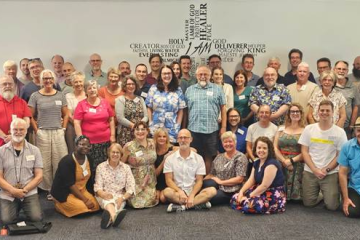Have you ever been lost? It’s not fun, is it! Don’t laugh, but just after we moved to Canberra, I, with three-year-old Zach in tow, got completely and utterly lost in the Canberra Centre carpark. I know it’s not that big, but I went out the wrong exit into the wrong section of carpark and walked to where my car should have been and it wasn’t… and suddenly, I was completely disoriented. I am someone – my family can tell you – who prides themselves on their sense of direction – who always knows which way to go – but it had failed me. It was not pretty! But we retraced our steps and inside I realised we might have taken the wrong exit and then – there was the car! Whew!
A few weeks ago, Christine Redwood, the pastor of Seaforth Baptist preached for us, and spoke about John the Baptist being in the wilderness, just as Jesus is in today’s reading, and she asked the question, “Why?” “Why was John in the wilderness?” Perhaps, she said, because this was his way of connecting with God – in the same way many of us like to get out into nature – to escape the noise (and devices) of daily life. Perhaps, she said, he was in the wilderness because, from his reading of Scripture, this was where his people had been during times of crisis and God had met them there.
As I said in Sunday to Sunday this week this experience of the wilderness – the metaphor of the wilderness – is one that resonates with where we are at the moment. So, for the next few months, we are working through a series based on Sarah Bessey’s book, Field Notes for the Wilderness. (There will be reflection questions in the bulletin each week and small group discussions). Bessey writes, “We are in the midst of a shift in the Church that has resulted in many of us” finding ourselves in the wilderness. “Right now,” she says, “it’s even feeling a bit crowded.”
The wilderness is a place for “our questions and our truth”, but it is not easy being in the wilderness. As Christine said, John was in the wilderness “long after the novelty had worn off” and we will be too. “The wilderness,” Bessey writes, “can be a strange, disorienting, lonely place… It can be filled with danger and loss. But along the way we do find each other.”
Some of us find ourselves in the wilderness after a crisis in our lives. “We didn’t so much ‘cross a threshold into the wilderness’” Bessey says, “as much as fell, body and soul into the wasteland from the hospital or the divorce courts or the graveside or the church committee to ‘explore gender and sexuality.’” (Although as we know there is not much room for exploration in the NSW/ACT Baptist Association or even for the word ‘explore’!) We, as a church, can relate to this.
Some of us find ourselves in the wilderness due to a crisis of faith. Perhaps it was unanswered prayers… prayers we were told were unanswered because of sin or because we hadn’t prayed enough. Perhaps it was because the politics of church or the culture of church bore “no resemblance” Bessey writes, “to the brown-skinned Jesus who taught us to love our neighbours and our enemies.” Perhaps it was because we experienced spiritual abuse from people whom we trusted. I know, like me, many of you can relate to this.
And many of us – and I am glad Bessey also makes this point – have had really positive experiences of growing up in faith, experiences that have set us up well for a faith that continues to grow. In Bessey’s words, “If we don’t change and evolve over our lifetime, then I have to wonder if we are paying attention to the invitation of the Holy Spirit that is [our lives].”
So, welcome, all of you, to the wilderness!
What we are going to do over the next few weeks is explore some practices which might sustain us on this wild journey. I say ‘might’ because it is not a prescriptive list. “Some of these…,” according to Bessey, “will serve you well; others might be for someone else.” And I am sure that we will share other practices as we share this journey together.
There are three things, however, we need to know at the beginning.
Firstly, it is OK to find ourselves here in the wilderness. “You are not broken,” Bessey says. “You are not bad. You are not wrong, nor are you doing anything wrong.”
When I was at university there was an Anglican priest at the local church (one who also in the wilderness in relation to the Sydney Diocese) who said to me, “Just because your faith does not look like that of others doesn’t mean you are not faithful – that you are not devout.” I had a Uniting Church minister at the same time describe a time in his life when, he said, the sea of faith that he thought he had belonged in, had belonged to, had receded – but he realised, he said, even the emptiness was full of God.
This is what John the Baptist found, and what Jesus finds in our gospel reading, that the wilderness – with its emptiness, with its hunger and thirst, with its very real challenges to faith – is a place brimming with God.
The kind of faith that takes us into the wilderness, Bessey says, is a faith that “brings the new ideas and ancient paths together. It’s about rebuilding and reimaging a faith that works not only for [us] but for the whole messy, wide, beautiful world…. [It] is a resilient and stubborn…faithfulness that is well acquainted with the presence of God in our loneliest places and deepest questions…. For me, this has proven to be deeply centred in the Good News of Jesus.”
So, hear this! You are in the wilderness because you are following Jesus.
Secondly, you are in the wilderness because, like John, you are responding to what is happening in our church and our world. Bessey quotes Jesus’ words in Matthew 11:28-30, “Come to me, all you who are weary and are carrying heavy burdens, and I will give you rest. Take my yoke upon you, and learn from me, for I am gentle and humble in heart, and you will find rest for your souls. For my yoke is easy, and my burden is light.”
Jesus calls out, she says, “the heavy yoke that the religious elite or the powerful or our culture often [place] upon us. The burden isn’t imaginary… Christian nationalism [in the US], fearfulness, dehumanisation, religion as a measuring stick of worthiness, racism, cruelty, patriarchy, homophobia – these are real and devastating burdens.”
But know this! God knows the burdens we carry, that they are too heavy, and God comes beside us in the wilderness.
Finally, we need to recognise that the wilderness journey, by the very nature of it, by the very nature of life, will never be a nice, neat progression from point A to point B.
We were in this car this Christmas and Zach, no longer three, but nineteen now, said, “Let’s not talk about trivial things. Let’s talk about something real.” So, I said I had been feeling disoriented, in a different way, lately, that I’d had this idea Christian ministry would be a kind of upward progression. (That if you were to graph it it would go from here to here.) Yes, there would be some hurdles at the beginning – after all, I’m a woman in ministry – but then the ministry, the church, would go from strength to strength. But, I said, the reality is quite different. Yes, ministering to this church is a privilege and a blessing for me (my prayer is that it’s a blessing for you!) but momentum goes up and down, people come and go, volunteers are always hard to find. It feels like it has been a ministry journey not of steady upward progression, but with high points here and there, with strange detours and some very dark valleys.
As Jesus faithfully witnessed, there are no spectacular shortcuts in the wilderness. Like the story we read to our children, “you have to go through it”; and my imagined vision of ministry was not really ministry. Ministry is the road that we travel day by day together – and together with God.
At the start of Field Notes for the Wilderness Bessey quotes from French priest, scientist and philosopher, Pierre Teilhard de Chardin:
Above all, trust in the slow work of God. We are quite naturally impatient in everything to reach the end without delay.
We should like to skip the intermediate stages. We are impatient of being on the way to something unknown, something new.
And yet it is the law of all progress that it is made by passing through some stages of instability— and that it may take a very long time.
And so I think it is with you; your ideas mature gradually—let them grow, let them shape themselves, without undue haste. Don’t try to force them on, as though you could be today what time (that is to say, grace and circumstances acting on your own good will) will make of you tomorrow.
Only God could say what this new spirit gradually forming within you will be. Give Our Lord the benefit of believing that his hand is leading you, and accept the anxiety of feeling yourself in suspense and incomplete.
—Pierre Teilhard de Chardin, SJ, excerpted from Hearts on Fire
Let us give our Lord the benefit of believing that his hand is leading us – as we journey together through the wilderness.
Let’s sing together – Guide me, O thou great Jehovah.


